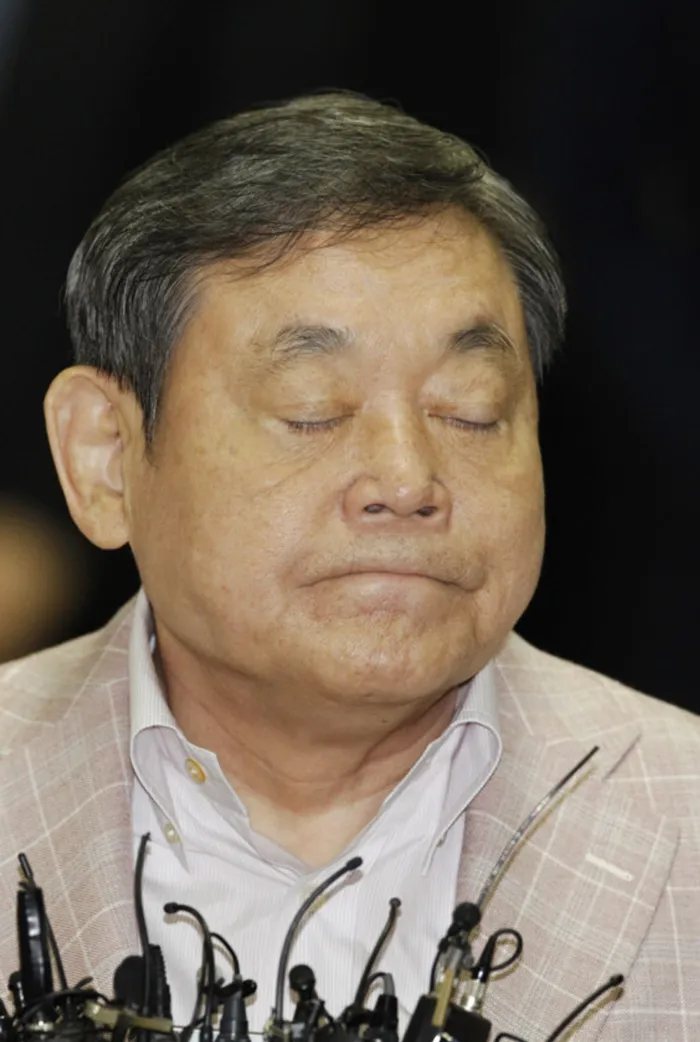Samsung chair fights off family in squabble over $850m stake

Samsung Electronics chairman Lee Kun-Hee reacts as he answers reporters' questions upon his arrival at Gimpo airport in Seoul after he visited several European countries and Japan, May 24, 2012. A family feud at Samsung Group, parent of the world's largest electronics company by revenue, could upset the smooth handover of control of a smartphones-to-ships conglomerate whose $234 billion annual sales are bigger than the economy of Singapore. Lee Kun-hee, South Korea's richest man and chairman of Samsung Electronics on May 30, 2012 defends three lawsuits from his elder brother, Lee Maeng-hee, a sister and another relative, who claim $1 billion of assets - mainly shares in Samsung Life, an insurance company at the heart of a web of Samsung Group cross-shareholdings. Lee is unlikely to attend the case at the Seoul Central District Court. Picture taken May 24, 2012. REUTERS/Lee Jae-Won (SOUTH KOREA - Tags: BUSINESS CRIME LAW HEADSHOT) Samsung Electronics chairman Lee Kun-Hee reacts as he answers reporters' questions upon his arrival at Gimpo airport in Seoul after he visited several European countries and Japan, May 24, 2012. A family feud at Samsung Group, parent of the world's largest electronics company by revenue, could upset the smooth handover of control of a smartphones-to-ships conglomerate whose $234 billion annual sales are bigger than the economy of Singapore. Lee Kun-hee, South Korea's richest man and chairman of Samsung Electronics on May 30, 2012 defends three lawsuits from his elder brother, Lee Maeng-hee, a sister and another relative, who claim $1 billion of assets - mainly shares in Samsung Life, an insurance company at the heart of a web of Samsung Group cross-shareholdings. Lee is unlikely to attend the case at the Seoul Central District Court. Picture taken May 24, 2012. REUTERS/Lee Jae-Won (SOUTH KOREA - Tags: BUSINESS CRIME LAW HEADSHOT)
Jun Yang Seoul
During his long and controversial career, Samsung Electronics chairman Lee Kun-hee has transformed his family’s food company into the biggest maker of televisions and cellphones, challenging Apple and Sony in the process. Now he must contend with feuding siblings.
At the age of 70, South Korea’s wealthiest citizen is facing down lawsuits that his older brother and sister are waging in an attempt to win a slice of the family wealth.
Lee Byung-chul founded what is today South Korea’s biggest business group in 1938 and died in 1987 without leaving a will, casting a shadow over the future of the $153 billion (R1.3 trillion) electronics firm.
The siblings’ demand for an $850m stake in the firm that generates 20 percent of South Korea’s gross domestic product threatens to be a costly distraction amid intense industry competition. The civil trial started yesterday.
“He has grown Samsung to the point where (South) Korea is called ‘Republic of Samsung’,” said Park Hyun-goon, the author of Lee Kun-hee’s Agony, a book about the Samsung succession feud published this year. “How would it make him feel if a share of that is taken away by his siblings or if his company goes down?”
The rancour comes as Samsung challenges US-based Apple, its biggest customer and its adversary in patent lawsuits. Samsung earned 7.64 percent of its revenue from selling components to Apple in the first quarter. At the same time, 30 cases on patents are pending from Paris to San Francisco between the groups, which traded leadership positions in the $219bn global smartphone market in the past three quarters.
Samsung sold one of every four cellphones in the first quarter, ending Nokia’s 14-year run as global leader in cellphones. Samsung shipped 94 million handsets, compared with 83 million for Nokia, Strategy Analytics said recently. Apple ranked third.
“The risk of losing your edge during these times is real,” said Matt Walker, an analyst at Ovum. “Companies… driven by innovation…can’t afford much down time to deal with this kind of turbulence.”
The family row drags Lee, a lung cancer survivor, back into a courtroom following a series of run-ins with the law.
“Ironically, the biggest risk to Samsung’s corporate governance is Lee Kun-hee himself,” said Chae Yi-bai, a researcher at the Centre for Good Corporate Governance. “The family dispute again highlights this inherent problem of Samsung.”
Neither the brother nor sister has any role in the group. At yesterday’s hearing in Seoul, their lawyer said the siblings were trying to regain wealth “they unfairly lost.”
The Lees didn’t attend. The next hearing is on June 27. Chairman Lee said last month that he would not give a “dime” to his brother because inheritance matters had been settled by his father. He later apologised for making the comments in public. – Bloomberg
